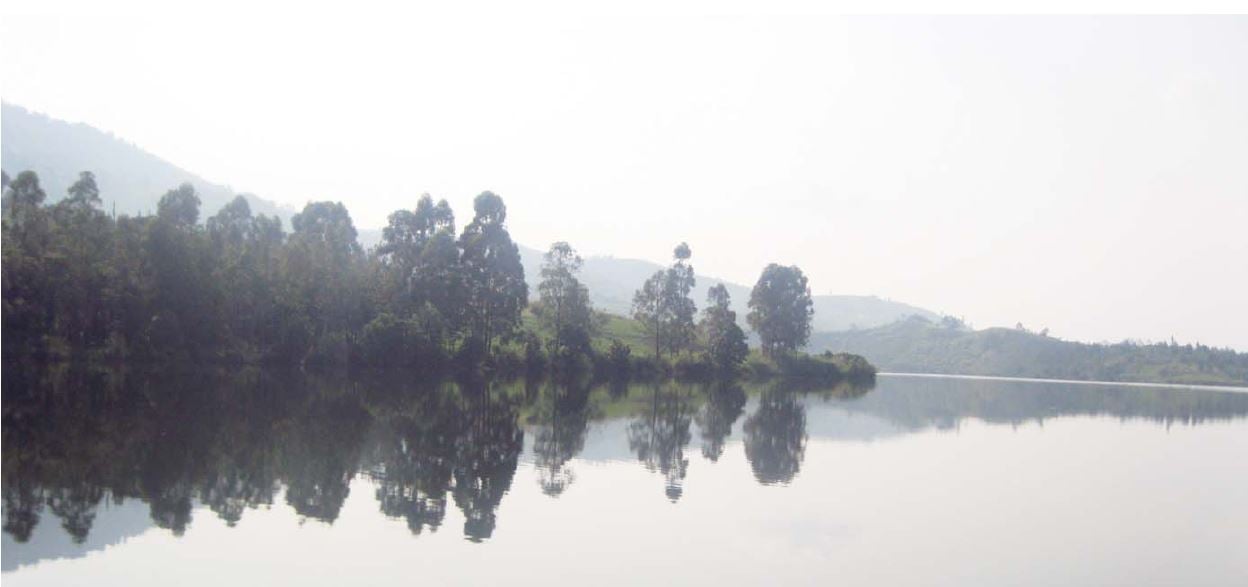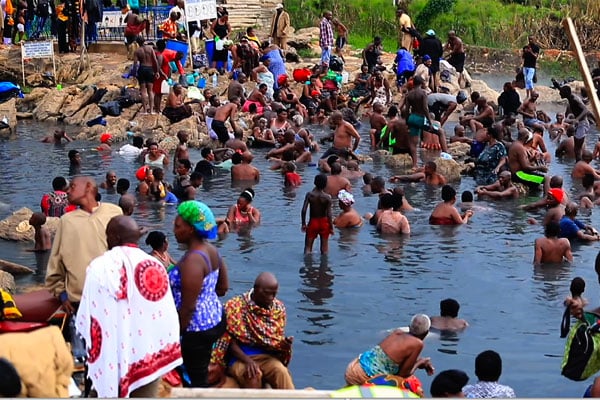Prime
Lake Nkugute, a place of mysterious tales

Children fetch water from Lake Nkugute which apparently claims lives of a boy and a girl annually. PHOTO BY ABDULAZIIZI K. TUMUSIIME
What you need to know:
In the newly-created Rubirizi District is Nkugute crater lake whose name apparently means swallow. The lake has been a blessing and curse to the nearby locals and numerous odd stories are told about it.
BY ABDULAZIIZI K. TUMUSIIME
For several decades, Lake Nkugute which is situated in Bunyarugu County in the newly-created Rubirizi District, has been a source of odd stories. It is a place of mystery, with a history that goes back to tales shared around campfires by the locals in the villages that surround it.
How it was formed
Nkugute is a crater lake which was formed as a result of volcanic activity in the Bunyaruguru volcanic field. The eruption in this field is more than 12,000 years. This is evidenced by the existence of hot springs within its vicinity such as Kitagata hot spring.
The lake is said to have derived its name from its violent nature and insatiable appetite for humans. According to Asuman Kyeyune who has lived near the lake for over 23 years, the word, “Nkugute” is a Runyaruguru word that means “swallow”. Tales in this area are that Lake Nkugute used to swallow two children, a boy and a girl, annually.
Mysterious tales about the lake
“Every year, the lake would swallow a male and female child and no one would predict when this was going to happen,” says Kyeyune.
“People who came to wash from the lake’s shore would at times forget to pay attention to their children who enjoyed swimming from the lake and before they knew it, one of the children would be seen helplessly screaming while being “swallowed” by the lake. Those who attempted to rescue the drowning child would sometimes also be “swallowed”. So the crater lake came to be known as Nkugute in reference to that behaviour.”
The boundaries of Lake Nkugute seen from a hill that borders the lake look similar to the map of Africa. Locals claim that it is the deepest lake in Africa, but there is no proof to this claim. In the past, the lake used to be surrounded by a very thick forest, but it was destroyed during the construction of the Mbarara-Kasese highway.
A lot of murram was also laid on the shores of the lake, making it more visible from far. Over the years, people began encroaching on the forest in a bid to get more land for cultivation. Presently, the lake is surrounded by banana plantations, tilled land as well as pine and mahogany trees.
Previous residents
Before these changes occurred, the lake was home to the Bachwezi, according to my guide, Benson Mutabaazi, who says that a lot of mysterious things happened to justify this. For example, after 10pm, anyone who walked past the lake would be stopped by very tall, dark skinned and strange people who would beat him/her up or take and abandon that person in any of the forests in the area. Mutabaazi whose father was a victim of these people’s wrath claims that they were Bachwezi.
“The locals who encountered these Bachwezi narrated that they would be found grazing long horned cattle. They would accuse the locals whom they punished for stealing their cattle. However, they would only attack those who would be walking alone because it was not possible to see them or be attacked when walking in a group,” states Mutabaazi.
The lake had a caretaker called Omuzumira Komurusozi, who was responsible for performing rituals to appease the gods of the lake. Whenever these rituals delayed, the lake would turn violent.
Reports of people drowning under unclear circumstances would be popular; it is then that people would seek the intervention of the caretaker to perform the rituals. The rituals involved slaughtering a goat and a sheep whose heads were dumped in the lake.
However, Mutabaazi says that following the prominence of religion in the area, people abandoned engaging in the rituals.
Nkugute is a major source of water for domestic use in Rubirizi. A dam was constructed at the boundary of the lake, which looks like the horn of Africa, to supply water around the district.
John Birungi, the LC 1 chairman of Ryemondo, the area where the lake is located says that washing clothes and cars from the lake was banned to ensure the water’s cleanliness.
A sign post can be seen at the shore of the lake cautioning members of the public against unauthorised access to the lake. Fishing on the lake is not popular which is attributed to lack of fish in the lake.
How it can benefit from tourists
The Lake is a popular destination for tourists though the locals have meagrely benefitted from the industry. Birungi explains that the tourists who come around just take pictures of the place and leave. He blames this on the absence of hotels or nice places of accommodation around the lake.
The chairman believes that if people could invest in hotels or a beach would be put up within the lake’s proximity, the locals could benefit from the tourism industry.
Editor's Note: An earlier photo that accompanied this story and which was given a wrong caption and attribution has since been removed and the correct photo placed.




